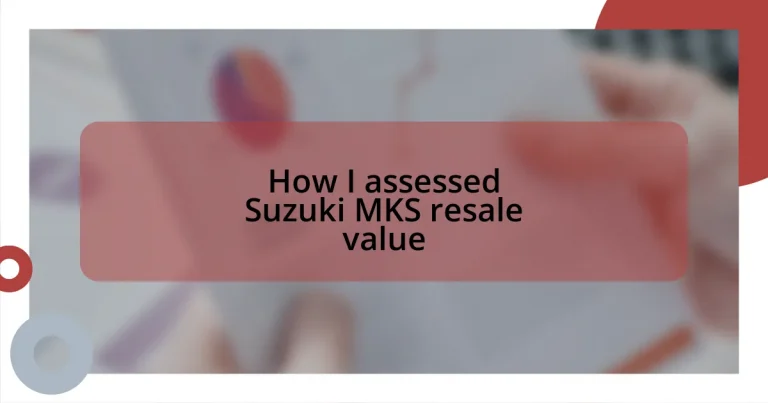Key takeaways:
- Condition and maintenance records significantly enhance a vehicle’s resale value.
- Mileage impacts valuation substantially, with lower mileage generally leading to higher offers.
- Market demand can shift quickly; factors like technology upgrades and seasonal trends are crucial.
- Utilizing online valuation tools assists in understanding market trends and setting competitive prices.
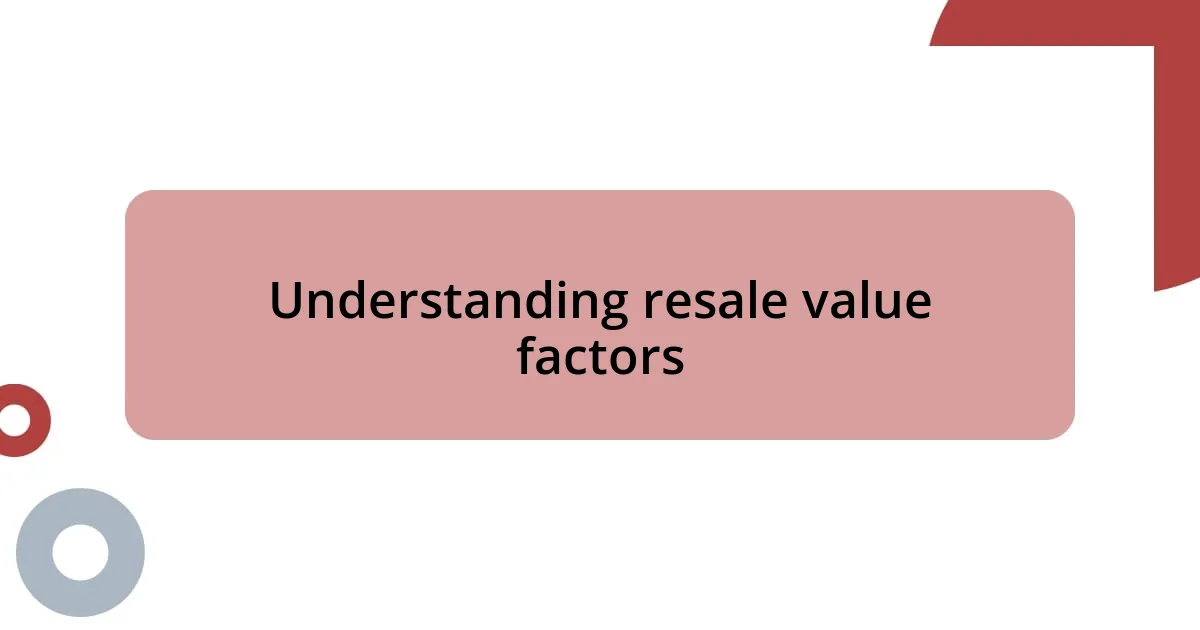
Understanding resale value factors
When I evaluated the resale value of the Suzuki MKS, I found that factors like condition and maintenance played a huge role. For instance, I meticulously kept records of all my servicing, which gave me confidence when it came time to sell. Have you ever experienced that relief when a potential buyer shows interest because your car is in great shape? It’s an incredible feeling.
Another element that can’t be overlooked is mileage. I once drove a car for years but kept the mileage low through careful planning. It’s surprising how much the extra miles can diminish a car’s value. Have you ever wondered how a few thousand miles can mean the difference between a great offer and a mediocre one? It’s all about making smart choices.
Market demand is also a crucial factor in determining resale value. I remember looking at similar models in my area and noticing how certain features really boosted their appeal. What extras or specifications do you think buyers value? Understanding these preferences not only helps in making the right purchasing decisions but can significantly impact future resale value.

Researching Suzuki MKS market trends
Researching market trends for the Suzuki MKS was an eye-opening adventure. I spent hours browsing online platforms, checking listings, and reading reviews. While some models were flying off the shelves, I found others lingering due to condition or mileage. It’s remarkable how one small detail can shift demand overnight!
- I analyzed sales data across different regions.
- I joined forums to gauge community interest and opinions.
- I compared features that drove higher pricing among similar models.
- Seasonal demand played a role; certain times of the year saw increased activity.
- I observed how recent technological upgrades influenced buyers’ preferences.
I can’t stress enough the value of tapping into social media conversations. Engaging with other Suzuki MKS owners opened my eyes to differing perspectives. I recall a lively discussion about color preferences where it became clear that certain shades were significantly more desirable than others. It’s those little insights that can steer your approach when deciding on upgrades or modifications. Have you ever shared a passion for a vehicle and learned something that transformed your buying or selling strategy?
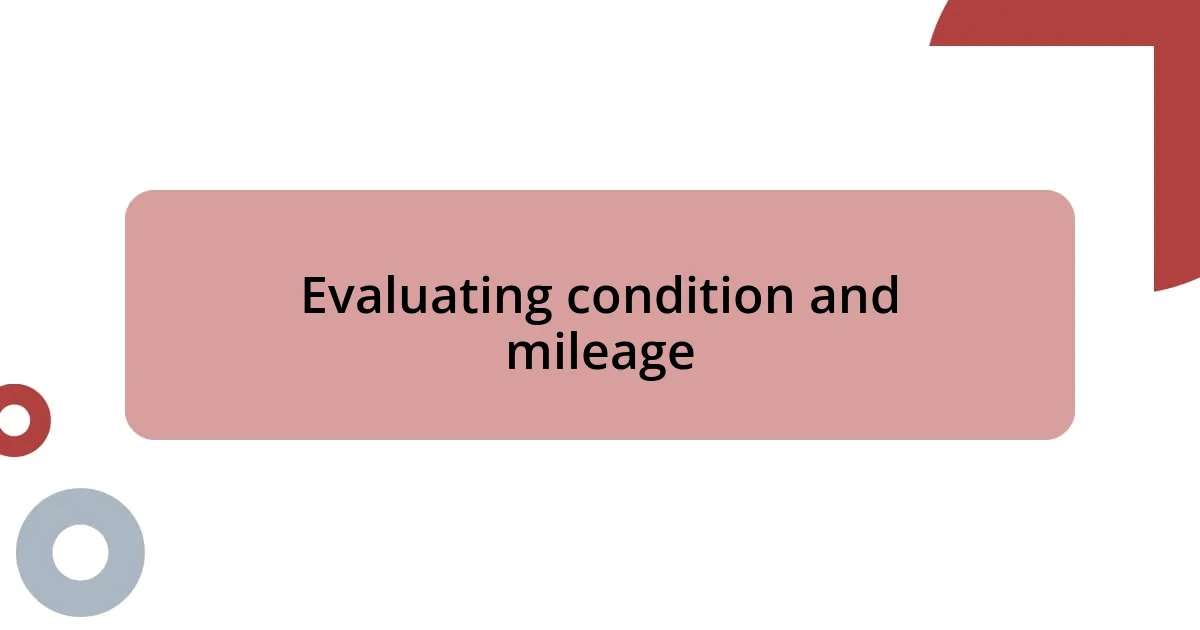
Evaluating condition and mileage
Evaluating the condition of a Suzuki MKS isn’t as straightforward as it may seem. I remember purchasing my first used car, I was drawn in by a shiny exterior but quickly learned that hidden mechanical issues can hurt resale value. You have to look beyond just the aesthetics—think about tune-ups, paint quality, and any signs of wear and tear. What if that dent could cost you a few hundred bucks on resale? It makes you really appreciate the importance of a thorough inspection.
Mileage, on the other hand, tells a story all its own. I once calculated the depreciation of my last vehicle based on mileage alone and was astounded. Each additional mile seemed to peel away at its worth, just like an onion. I found that a car with 40,000 miles could fetch quite a bit more than one with 80,000. Have you thought about how this could play into your current driving habits? The longevity of a vehicle often hinges on those early decisions, making it worth considering how you drive.
Lastly, I always recommend getting a professional assessment before selling a Suzuki MKS. There’s an emotional element to letting go, especially if you’ve created memories tied to that car. I still remember the road trips taken with friends that made my heart swell with nostalgia. I found that detailing the car and attending to minor repairs significantly improved my resale experience. It’s amazing how much a little TLC can translate into cold, hard cash when you’re ready to sell.
| Condition Criteria | Impact on Resale Value |
|---|---|
| Excellent (Well-maintained, no issues) | High |
| Good (Minor defects) | Moderate |
| Fair (Visible wear and tear) | Low |
| Poor (Serious issues or damage) | Very Low |
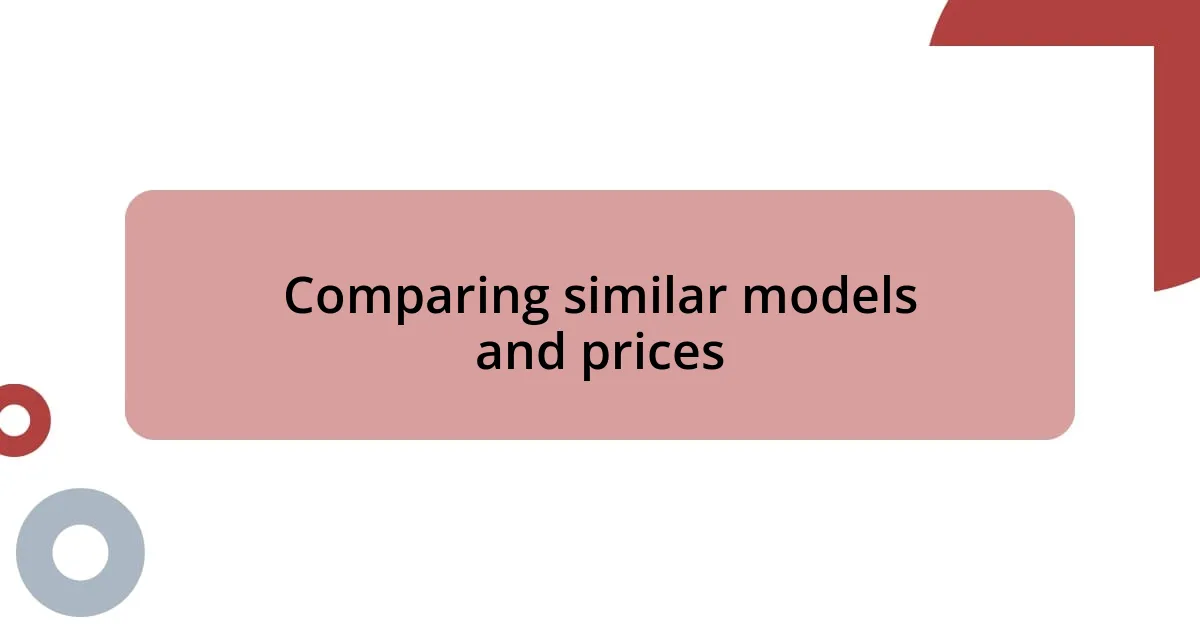
Comparing similar models and prices
When I dove into comparing the Suzuki MKS to similar models, I was struck by the variety in pricing. I remember seeing that while some competitors were popular for their fuel efficiency, the MKS stood out for its overall comfort and features. Have you ever noticed how a vehicle’s reputation can elevate its value, even if the specs on paper look similar?
I also took note of specific features that significantly impacted resale values. For example, models with advanced safety technology like lane departure warnings demanded higher prices than those without. I can think back to a friend whose MKS sold for much more because it had upgraded infotainment; it’s crazy how much little upgrades can turn into big bucks when it comes time to sell!
Lastly, I found geographic location played a big role in resale comparisons. In urban areas, compact vehicles often edge out larger models, while in rural regions, the reverse holds true. I recall a conversation with a seller in a city who lamented how his MKS lost value simply because of its size. It made me rethink where I might sell in the future, and how crucial it is to be aware of the local market conditions. Have you reflected on how your location could impact your car’s resale worth?

Analyzing historical resale data
Analyzing historical resale data reveals patterns that can be eye-opening. I remember scrolling through auction sites and noticing how models from certain years commanded higher prices. Specifically, a Suzuki MKS from 2017 had a significantly better resale value than models from 2015, highlighting how design updates and tech enhancements can age a vehicle like fine wine.
Diving deeper into the resale statistics, I found that regional demand plays a critical role. One year, I saw a cluster of Suzuki MKS listings in my area; they sold quickly, often above the average market price. It got me thinking about how localized trends could guide my own buying and selling decisions. Have you considered how the popularity of certain models could vary depending on your hometown?
Also, I can’t shake the memory of a friend’s experience while tracking his MKS resale value over the years. He meticulously kept his car’s service records, which ultimately became a powerful selling point. Prospective buyers were drawn to the documentation of regular maintenance, and it showed me how historical data, both for the model and individual vehicle, could dramatically impact what people are willing to pay. It’s fascinating to think that your car’s history, with all its bumps and bruises, might hold the key to its future value.
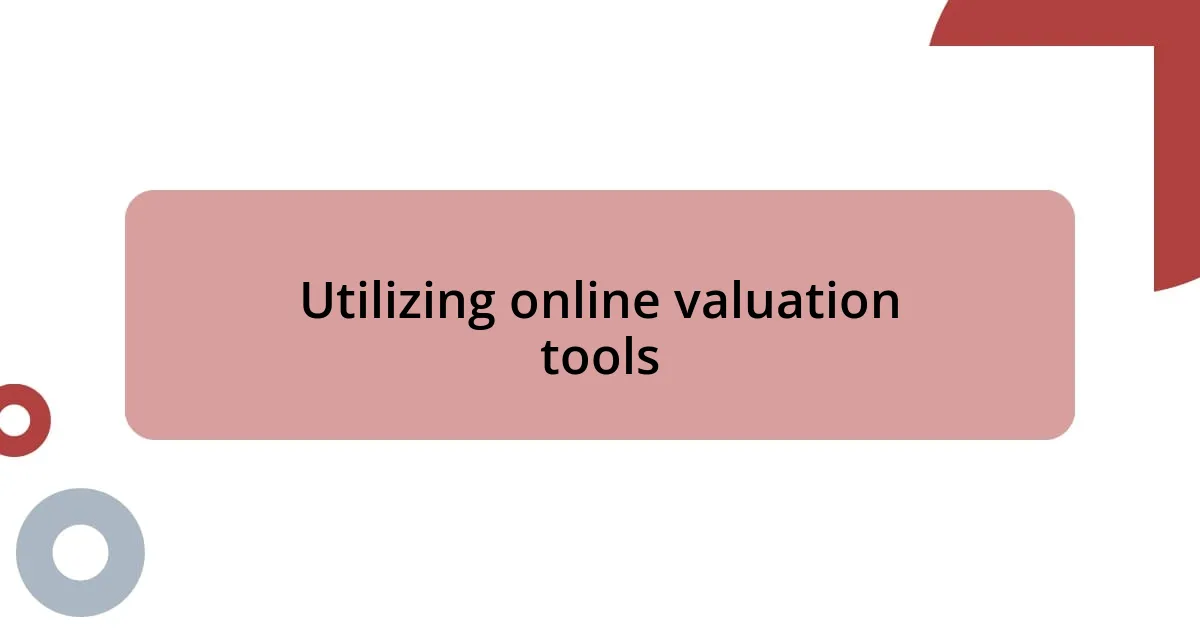
Utilizing online valuation tools
Utilizing online valuation tools has been a game-changer in my assessment of the Suzuki MKS. I vividly remember the first time I jumped onto a car valuation website; it felt like peering into a crystal ball that revealed my car’s worth based on real-time data. These tools, powered by algorithms that pull in various market factors and historical sales, provide a comprehensive view of where my vehicle stands. Have you ever wondered how accurate these online estimations can be?
While I initially thought that these tools would simply give me a number, I quickly realized they also offered insights on market trends and pricing strategies. For example, I once used one tool that highlighted just how much demand was fluctuating based on seasonality. The tool suggested that the best time to sell my MKS was right before winter—just as people began shopping for all-wheel-drive cars. I was surprised at how much I could leverage this information to maximize my vehicle’s resale value. Isn’t it refreshing to think of technology working in our favor like that?
In addition to pricing estimates, the tools also presented comparisons with similar models and made me aware of unique selling points. When I entered my MKS’s details, the tool pointed out that popularity in my area influenced resale prices significantly. I recall a time when a friend sold his MKS after valuing it online, which set a benchmark for quick sales—almost like referral marketing among friends! It made me realize that these online tools are not just about numbers; they’re a crucial part of the entire selling journey. Have you taken advantage of what technology has to offer in your own car transactions?

Making informed selling decisions
Making informed selling decisions often hinges on a blend of intuition and data analysis. I remember sitting at my kitchen table, sipping coffee while comparing different listings online. It struck me how much I could learn from just a few hours of research—colors, mileage, and condition all played significant roles in setting a competitive price. This experience taught me that informed decisions stem from knowing the market inside and out. Have you ever considered how small details can tip the scales in your favor?
As I prepared to list my Suzuki MKS, a friend shared a tip that shifted my perspective. He suggested harnessing social media to gauge interest before even posting a sale. I was surprised at how engaging my network could bring potential buyers out of the woodwork. How many of us overlook the power of our personal connections? It reminded me that selling isn’t just about the car; it’s about sharing its story and the community you’ve built around it.
Ultimately, I learned that timing is everything in sales. Reflecting on my own experiences, selling my MKS during peak seasons produced better offers than any other time. I can still recall the rush of excitement as I received multiple inquiries within hours of my listing. It made me realize that being well-informed is just as crucial as making timely decisions. So, when do you plan to sell your vehicle? That just might be the most important question of all.












